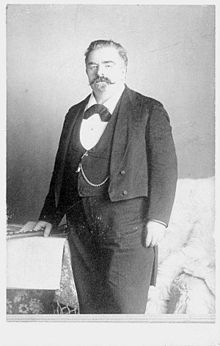Carl Wehner
Carl Wehner (born February 27, 1838 in Würzburg , † March 27, 1912 in New York City ) was a German flautist and composer .
Life
Wehner learned to play the flute with Caspar Röder in Würzburg and played in the local theater orchestra. In 1856 he went to Munich to study with Theobald Böhm at the Conservatory with the support of friends and patrons .
1867 Wehner went to St. Petersburg and was a soloist of the Mariinsky Theater - Orchestra with Cesare Ciardi as colleagues. He also gave lessons and introduced the Böhm system there. In 1884 he left St. Petersburg again.
In 1885 Wehner became a soloist in the orchestra of the Royal Theater in Hanover . Soon he went to the United States , where he quickly became the leading flautist. From 1886 to 1902 Wehner was a soloist with the New York Philharmonic , the New York Symphony Society and the Metropolitan Opera .
Wehner played the wooden flute with Böhm mechanics and hated the metal flute . When the French flutist Georges Barrère performed the contemporary silver flute in New York City in 1905 , Wehner lost his reputation as the best flutist and flute teacher. In 1909 Wehner and Leonardo De Lorenzo became close friends. Wehner composed etudes for flute, the Canto Elegiaco and 12 exercises for the rapid development of technique .
Web links
Individual evidence
- ^ A b Leonardo De Lorenzo: My Complete Story of the Flute: The Instrument, the Performer, the Music . Texas Tech University Press, Lubbock, Texas 1992, ISBN 0-89672-277-5 .
- ↑ a b c d Carl Wehner (accessed December 9, 2016).
- ^ A Flute for the Tsar (accessed December 9, 2016).
- ^ Würzburg, June 29, 1856 . In: New magazine for music . tape 45 , no. 4 , 1856, pp. 36 .
- ↑ Local and from the circle: Mr. Carl Wehner from here . In: Würzburger Anzeiger . No. 143 , 1856.
| personal data | |
|---|---|
| SURNAME | Wehner, Carl |
| BRIEF DESCRIPTION | German flautist and composer |
| DATE OF BIRTH | February 27, 1838 |
| PLACE OF BIRTH | Wurzburg |
| DATE OF DEATH | March 27, 1912 |
| Place of death | New York City |
